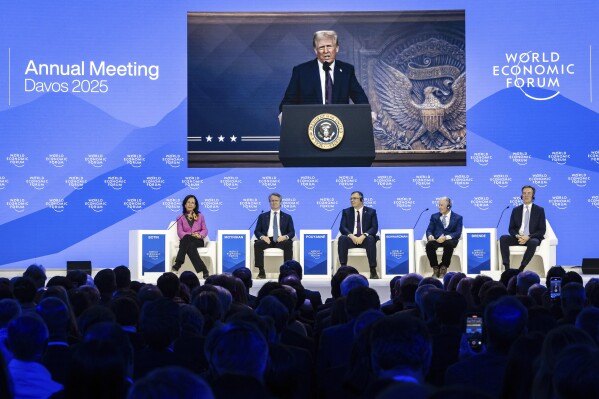He publicly questioned Federal Reserve Chairman Powell's interest rate policy and claimed to "understand interest rates better than the Federal Reserve."
On January 24, Trump delivered a highly informative speech via video at the annual meeting of the World Economic Forum in Davos, covering tariff policies, energy issues, the Russia-Ukraine conflict and policy intervention suggestions for the Federal Reserve.The speech demonstrated the Trump administration's new interpretation of the "America First" economic strategy.
In his speech, Trump first warned global companies that if they do not produce in the United States, they will face high tariffs of "hundreds of billions or even trillions of dollars."This fierce statement clarified the U.S. government's firm position on promoting the return of manufacturing.He also promised to further reduce the corporate tax rate for companies manufacturing in the United States from the current 21% to 15%.
Trump said this will not only attract investment, but also create a large number of jobs while alleviating inflation.He also criticized the economic policies of the previous administration, arguing that high deficit spending and energy restrictions had a "disastrous impact" on the economy, while the current administration is restoring the vitality of the U.S. economy through measures such as tax cuts and loose regulation.
Trump specifically mentioned the commitment of international partners such as Saudi Arabia and SoftBank Group to the U.S. economy.The Saudi Crown Prince has previously promised to invest and trade in the United States totaling US$600 billion in the next four years, while SoftBank has participated in the "Stargate" project, an important project in the construction of artificial intelligence infrastructure in the United States.This once again emphasizes the Trump administration's efforts to attract global capital and technology.However, the strategy has also been criticized, with many worried that the reliance on international capital will further complicate U.S. policy.
In his speech, Trump also criticized the EU for having too high tariffs and too strict regulatory restrictions, and said he would take corresponding measures against Europe to balance the trade deficit.He specifically mentioned the European Union's huge taxes on U.S. technology giants, including a $15 billion tax on Apple, a multi-billion dollar fine on Google, and a plan to tax Facebook.He viewed the actions as unfair treatment of U.S. companies and said the U.S. government would further increase trade pressure on the EU through energy agreements and other means.
In the energy sector, Trump called on OPEC to lower oil prices to fight global inflation and relieve economic pressure on U.S. consumers.He further pointed out that lower oil prices would not only reduce spending for American households, but also create room for global interest rates to be lowered.
He publicly questioned Federal Reserve Chairman Powell's interest rate policy and claimed to "understand interest rates better than the Federal Reserve" and called on the Federal Reserve to cut interest rates immediately.Trump's remarks directly promoted the rise of the three major U.S. stock indexes. The S & P 500 index hit a record high, the Dow Jones Industrial Average rose 0.92%, and the Nasdaq index rose 0.22%.
Trump also emphasized that the United States will ensure the stability of energy supply to support the European economy.He said that the United States will reach a long-term energy cooperation agreement with the EU through liquefied natural gas (LNG) exports to help Europe cope with high energy costs.This commitment is crucial to European countries. Especially in the context of the ongoing conflict between Russia and Ukraine, energy security has become the top priority for European countries.
However, Trump's tough stance has also aroused concerns in the international community.World Trade Organization (WTO) Director-General Ngozi Okonjo-Iweala warned that Trump's tariff threat could spark a global trade war, which would have serious economic consequences.She specifically mentioned the Smoot Hawley Tariff Act of 1930, when the United States imposed high tariffs, which led to a contraction in global trade and further exacerbated the impact of the Great Depression.Ivira called on all countries to remain calm, resolve disputes through international rules and mechanisms, and avoid a repeat of trade wars.
In the crude oil market, Trump's remarks quickly triggered price fluctuations.WTI crude oil prices fell 1.4% intraday, while Brent crude oil fell 1.2% intraday. The decline in U.S. stocks widened further after the close.This shows that the market is uncertain about Trump's strategy of exerting pressure on OPEC. Especially in the context of the current weak global oil demand, it is unknown whether OPEC members will cooperate with Trump's request.
On January 20, the annual meeting of the World Economic Forum grandly opened in Davos, Switzerland. Political and business leaders from around the world gathered together to discuss major global economic and geopolitical issues.Although Trump was unable to attend the venue in person due to the inauguration, his name and policies were at the heart of many discussions.Trump's speech at the Davos Forum once again reflected the core logic of his "America First" policy, which is to attract investment and reshape manufacturing through tough tariff policies and tax cuts, while consolidating the United States through energy and trade means. Global economic leadership.

